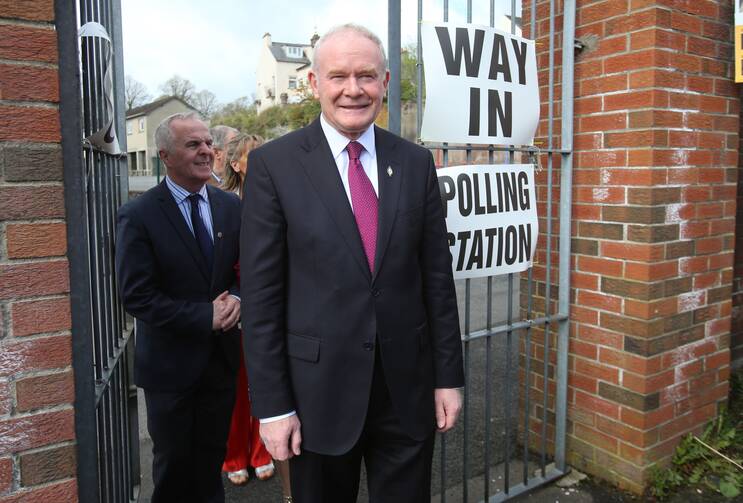As the results came in over much of Friday, it has become more clear that U.K. voters are heading in multiple different directions, depending on where you look. The continuing turmoil within the Labour Party is arguably the biggest story, but their decline is not uniform around Britain. They largely held their ground in many parts of England.
Even in the Celtic nations, Labour is experiencing differing fortunes. They stayed strong in Wales while not securing an outright majority, having been surprised by U.K. Independence Party’s unforeseen success, the latter taking their first-ever seats in the Cardiff Bay “Senned.” Labour, drawing consolation in the few places it can, remains the largest party in that nation.
In Scotland, their predicted near wipe-out almost came to pass, but not quite—with counting completed by late on Friday morning, they had slipped, battered and bruised, to a remarkable third place behind the Tories, who, having taken the second largest number of seats now form the official opposition in the Holyrood Parliament. It is hard to say which takes the breath away more—the eclipse of the party of whom it used to be said in Scotland that you could weigh their votes, not count them, or the resurgence of the Tories, widely loathed in Scotland since Margaret Thatcher’s time. The Conservatives have fared rather well in Scotland, at the expense of the sick Labour Party, but not in London; results around the countries, in the various other local elections, do not yield a single consistent pattern.
The Scottish National Party duly won a third consecutive victory in the Edinburgh Parliament election. It was not a repeat of the eye-catching, breathtaking sweep that we saw in the U.K. General Election last year, when they swept all before them. They fell three seats short of an outright majority. They had campaigned on the slogan “Both Votes S.N.P.,” a reference to the hybrid voting system in that election.
Some of the 129 seats, or constituencies, are directly elected first-past-the-post, whereas others are “regional list” seats, employing proportional representation. When this electoral system was devised in the late 1990s, it was meant to prevent any one party (which really meant the S.N.P.) gaining an outright majority with a minority of the popular vote.
The then-Labour U.K. administration, U.K. unionist then as now, tried to head off a growing demand for full independence, not just devolution, fearing that any loss of their Scottish seats could damage their chances of winning Downing Street. That fear came to pass anyway but in the U.K.-wide election, not the Edinburgh one. Labour’s old strategy could be said to have worked this time, while noting that the outgoing administration did win that outright majority. This time, while Labour have flailed, the Tories have made something of an unexpected comeback; they, not Labour, prevented the S.N.P outright majority.
Competing for our attention with Labour’s woes is London’s mayoral contest, directly elected since 2000 and the first such mayoralty in the county. In another divergence, here Labour have prevailed, as Sadiq Khan took control of the riverside City Hall by a comfortable margin from the Tory candidate, Zac Goldsmith. Each had competed to replace Boris Johnson, now a Commons M.P. and a leading figure in the Brexit campaign, said to have his eye on the keys to 10 Downing Street at some point in the near future.
Attention now moves to the June European Union referendum across the U.K. nations. This week’s elections and their outcomes have not told us anything about likely patterns in the referendum. In Scotland it will be fascinating to watch how the Nationalist pro-independence parties, which include the articulate and increasingly popular Greens, proceed with proposals for a second independence referendum.
One imagines that nothing will be said for the next few weeks while attention turns to the Brexit referendum; S.N.P. leader Nicola Sturgeon made few explicit references in this election to seeking a mandate for a second “IndyRef” even as the Tories spoke often of defending the union. We should watch for decisions to align with the “Bremain” camp or moves to make a renewed case for an independent Scotland, with a vote and a voice in Europe. One possible, game-changing outcome is that, for lack of an outright majority, the second independence referendum may not be as inevitable as was thought and the question may well not arise again until the next elections in 2021. What happens in the June referendum, of course, may yet change all that.
In Northern Ireland the AP reports:
Northern Ireland's major British Protestant party, the Democratic Unionists, appeared on course to retain its leading role in power-sharing Friday as Catholic backing for Irish nationalist parties declined for the first time in decades. With all first-preference votes declared in Northern Ireland's complex system of proportional representation, the Democratic Unionists won 29.2 percent support, down 0.8 points from the last Northern Ireland Assembly election in 2011.
The major Catholic-backed party, Sinn Fein, retained its dominant position in Irish nationalist districts but saw its vote fall by 2.9 points to 24 percent, an unexpected slide following two decades of relentless gains aided by the 1990s Irish Republican Army cease-fires.
Sinn Fein had hoped to overtake the Democratic Unionists and gain the top post in Northern Ireland's 9-year-old unity government. Instead it faces a challenge to retain all of its 29 seats in the 108-member assembly.... Deputy First Minister Martin McGuinness, faced a long road to victory in his home city of Londonderry. McGuinness, a former IRA commander, finished the first round of voting barely ahead of a moderate nationalist challenger.
Sinn Fein suffered a shock in its Catholic west Belfast power base, where a young socialist candidate from the upstart People Before Profit party topped the poll.
David Stewart, S.J., is America's London correspondent.








